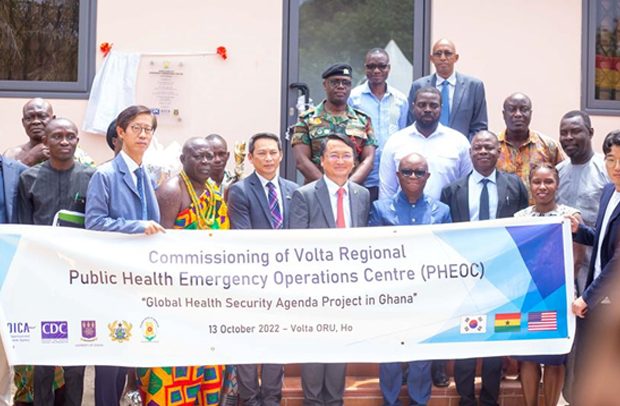US Centres for Disease Control and Prevention Country Director Dr. Tony Ao (centre left) commissions the Volta Regional Public Health Emergency Operations Centre with partners from the Republic of Korea and Ghana
The US Government, through the US Centre for Disease Control and Prevention (CDC), has commissioned the Volta Regional Public Health Emergency Operations Centre (PHEOC) in Ho, the fourth such centre opened in Ghana since 2021.
The $200,000 centre represents a collaboration between the governments of the United States, South Korea, and Ghana. Three others have already opened in Kumasi, Sekondi, and Tamale.
Representing the United States, CDC Country Director Dr. Tony Ao joined Volta Regional Minister Dr. Archibald Yao Letsa, Ghana Health Service Director General Dr. Patrick Kuma-Aboagye, and the Republic of Korea Ambassador to Ghana Lim Jung-taek in the commissioning of the Volta Regional Public Health Emergency Operation Centre (PHEOC) in Ho on October 13.
“Public health emergency operations centres play an integral role in the coordination of responses to public health threats, such as Marburg virus disease, COVID-19, polio, and monkeypox. These recent outbreaks underscore the need for a network of regional coordination centres to improve data sharing that drives decision-making, informs national policy, and allows rapid response to new emergencies,” said Dr. Ao.
A PHEOC serves as the central command centre and brings together important stakeholders and experts for coordinated responses to public health events and threats, like COVID-19, polio, and Ebola. It provides real-time data analyses and visualisations that promote evidence-based decision making.
Regional PHEOCs are a part of a sustainable approach to building a resilient and responsive public health infrastructure in Ghana and will link with the national PHEOC for mutual and timely sharing of critical pandemic and health emergency information.
These centres are a clear example of how strong partnership can advance the Global Health Security Agenda (GHSA) through leadership of the regional authorities and Ghana Health Service and technical assistance from CDC with support from the Korean International Cooperation Agency (KOICA).
The GHSA is a group of 70 countries (including Ghana, the Republic of Korea, and the United States), international organisations, non-governmental organisations, and private sector companies that have come together to achieve the collective vision of a world safe and secure from global health threats posed by infectious diseases. Establishing a network of PHEOCs is one of the key strategies of GHSA.
CDC plays a leading role in implementing the GHSA through its work to prevent, detect, and respond to infectious disease threats.
From vaccines to oxygen equipment to long-term health infrastructure investment and coordinated health information, the United States Government has made a decades’ long commitment to Ghana’s public health systems. This includes life-saving initiatives such as GHSA, the US President’s Malaria Initiative (PMI), and the US President’s Emergency Plan for AIDS Relief (PEPFAR).


